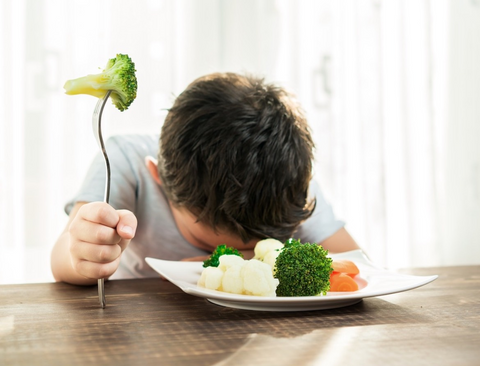Kids fussy eaters?
Share

Are you finding it challenging to persuade your children to eat the nutritious meals you prepare?
You are not alone!
It can be the bane of a parent's life getting their little ones to eat a nourishing meal!
Here are my top tips and tricks for getting kids to eat healthy whole foods without losing your sanity!
ARMY IN THE BODY
It's important for our kids to understand why they need to eat healthy foods.
Explain to your child that we all have an army of good bacteria living in our body (our microbiome). This army protects us from getting sick, helps us concentrate and be focused and attentive. The army makes neurotransmitters that help us feel happy and calm. They also play a crucial role in helping us digest our food and they make us sleep soundly! The gut flora are truly amazing, the list goes on!
Our army LOVES food from nature such as veggies, fruits, root vegetables, meats, eggs, non-glutinous grains, nuts and seeds.
Food made in factories, that is processed and full of artificial food chemicals, such as additives, sugars, seed oils, colours, flavour enhancers (the list goes on) damage our microbiome and make our army weak and tired so they can't keep our bodies healthy.
Little ones love imaginative play, helping them visualise their army as ninja's, or fairies or superheroes can really help them to buy into the concept of feeding their army.
Example
'Well done trying the cucumber, I can hear the army in your body cheering! They are so happy that you ate that lovely healthy food! The army can now protect your body and make it so healthy, fast and strong! Yay! '.

SUPPORTING YOUR CHILD TO EAT
Changing our children’s diets can be challenging initially. But stick with it, consistency is key. Keep going, don't give up.
- Focus on the whole foods from nature that you know your child likes initially. When they are eating those familiar whole foods well, then introduce new wholefoods slowly. Give loads of praise and encouragement when they try new foods.
- Showing gratitude to the food is really important. Point out with excitement how the food grows in nature. For example, how amazing it is that a bee pollinates the flower and then the tree grows the fruit using fuel from the sun, rain and the nutrients from the soil. Acknowledge the farmers and growers who look after the animals, plants and trees so they could produce food for us. Fostering a deep gratitude for the miracle that is nature and how our food is produced is important from an early age. This helps to foster a positive mindset towards wholefoods.
- Distraction can be a very helpful technique to help kids eat. I've used it on my own kids and with thousands of patients over the years and it really works. Start by eating all together as a family at the table. When the child starts losing interest, wanting to get down or refusing their meal then this is when distraction comes in. Reading at mealtimes is a brilliant distraction to help kids that are too tired and overwhelmed by the food. It also helps kids who have sensory issues with food textures. This works for all ages from 6 month's through to older children. Reading a book at mealtimes takes the focus off the food and onto the story. They can eat without really thinking about the food and the parent can pop little bites in the child's mouth without them really noticing. All of sudden most of the meal is in without too much stress at all. For kids who don't like books, feeding them while they are playing lego or similar can also work well.
- Help your child to eat, feed them if you need to. Just like manners or crossing the road, eating is a learnt behavior that doesn't come naturally to many, especially kids with digestive or sensory issues. Using the distraction technique above and helping them eat takes a lot of pressure off at mealtimes. Often kids come home from kindy, daycare or school and they're just exhausted. Eating is too hard and overwhelming. Giving them a cuddle (they will be calmer and more regulated by the warmth of your body, your respiratory and heart rate), reading a story and helping them by popping bites in their mouth takes all the pressure off so they have a lovely nurturing experience with mealtimes. You won't have to do this forever as they get older and their gut health improves, they will get more and more able to manage meals on their own.
- Try the 'bite for bite' technique. Offering a bite of food they really want as a reward for taking a bite of the food they are less keen on i.e. "Yes, you can have your potato, but you need to give your army some food as well. Have one bite of avocado or celery and then you can have a bite of potato" and repeat. This can work really well for some kids. Don't use treats as a reward as this sets up bad habits.
- Another effective strategy is to present the food your child is less fond of first. For instance, if they readily eat vegetables, fruits, and carbohydrates but are averse to protein, you should offer the protein initially. After they've eaten the protein, they can then have the foods they prefer. Children often consume their favorite items first, fill up and neglect the rest. Introducing less preferred foods when they are hungriest tends to be more successful. For example, " Yes you can have your rice, but you need to eat your chicken first, so you get some protein in your body to fuel your brain and muscles properly. Once you've eaten 1/2 your chicken then you can choose the foods on the plate you want to eat'.
- Ensure you give both protein and fruit/veggies at EVERY meal. Protein is fundamental for optimal mood, behavior, energy, growth and immunity. Veggies/fruits give us vitamins, minerals and phytonutrients, feed the beneficial gut flora and wash toxicity out of our bodies. Giving both at every meal helps kids feel calm and regulated which helps everyone feel happier! Don't just feed your kids carbs alone, this is a recipe for disaster elevating blood sugar levels which causes behavior issues.
- Kids don't prioritise food, but they NEED IT. They won't tell you they are hungry, but their behavior will deteriorate, or they will become tired and frustrated easily. Preempt this by ensuring your child eats 5 x a day. Breakfast, morning tea, lunch, afternoon tea and dinner. Feeding them every 2-3 hours is important to avoid the wheels falling off. Take lunch boxes everywhere you go so the kids always have access to food. This will stop many a meltdown and will help to keep them fueled and nourished.
- When all else fails then try some good old-fashioned bribery! Go to your local op shop, buy a load of little toys/books/clothes that you think your child would like. Wrap them up as a lucky dip. Discuss the upcoming dietary changes and the reasons behind them. Let your child know that if they eat a reasonable amount during the meal, they can pick a lucky dip as a reward. Many children adore this approach. It usually only needs to be done for a week or less, and during that time, their mindset, taste buds, and microbiome will have adapted sufficiently to continue without the incentives.
- Some children do have digestive issues that are causing them to be particularly fussy, such as low beneficial gut flora, digestive infections or allergies. Testing these to rule out the root cause of why they are restricting certain foods can be really helpful as then treatment can be put in place to work on the root cause of their issues.

WANT TO IMPROVE YOUR CHILD'S DIET BUT DON'T KNOW WHERE TO START?
Try the Nourish 4-Week Gut Reset.
A perfect guide to improving your kids gut bacteria so their ‘Army’ becomes super healthy!
This guide is designed for both adults and kids. The program will give you straightforward, easy to follow steps on how to navigate a nourishing diet in this modern world.
All recipes feed " The Army In Our Body " to improve our gut bacteria/microbiome and overall health, behavior and immunity.
It's not just for those with gut issues, it is for anyone who wants to improve their health and the health of their kids.

Some improvements we see in our children’s health when we focus on nourishing their body and microbiome using whole foods from nature.
- Improved immunity
- Digestive and bowel issues resolve
- Better sleep
- Improved behavior
- Improved focus and attention
- A calmer and more regulated mood
Don't worry it doesn't need to be completed in 4 weeks. You can do it in your own time at your own pace. Slow sustainable change is key to making permanent changes long term.
This program the basics of what to eat and how to keep healthy long term in one simplified e-Book.

Start your journey!
Get your kids health and behavior back on track.


Are you a current or previous patient? Have you done my 4-Week Gut Reset? I would love it if you could please write a short google review. I really value your feedback.

